#the heron heareth
Note
THE terror? you mean there's only one? phew, that's a relief, once this one scary thing happens then everything will be fine n dandy i just know it will 😁👍🏻
exactly its just the one so we dont have to worry abo🐻❄️ut a single thinghey what was that. did you guys see that
218 notes
·
View notes
Photo
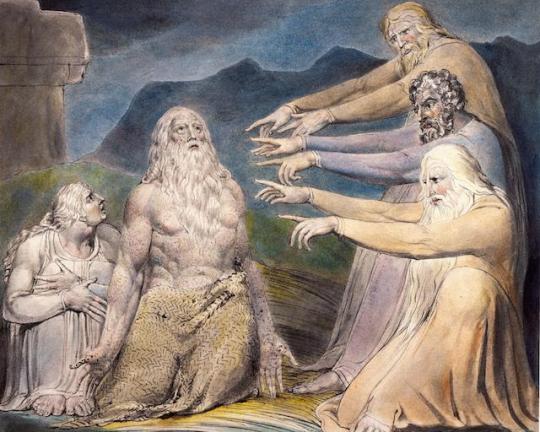
BOOK OF JOB - From The Douay-Rheims Bible - Latin Vulgate
Chapter 39
The Book of Job shows how human affairs are ruled by Divine Providence using probable arguments.
"Although you hide these things in your heart, I know that you still remember everything." - (Job speaking to God)
***
INTRODUCTION. This Book takes its name from the holy man, of whom it treats; who, according to the more probable opinion, was of the race of Esau, and the same as Jobab, king of Edom, mentioned Gen. xxxvi. 33. It is uncertain who was the writer of it. Some attribute it to Job himself; others to Moses, or some one of the prophets. In the Hebrew it is written in verse, from the beginning of the third chapter to the forty-second chapter. Ch. --- The beginning and conclusion are historical, and in prose. Some have divided this work into a kind of tragedy, the first act extending to C. xv., the second to C. xxii., the third to C. xxxviii., where God appears, and the plot is unfolded. They suppose that the sentiments of the speakers are expressed, though not their own words. This may be very probable: but the opinion of those who look upon the work as a mere allegory, must be rejected with horror. The sacred writers speak of Job as of a personage who had really existed, (C.) and set the most noble pattern of virtue, and particularly of patience. Tob. ii. 12. Ezec. xiv. 14. Jam. v. 11. Philo and Josephus pass over this history, as they do those of Tobias, Judith, &c. H. --- The time when Job lived is not clearly ascertained. Some have supposed (C.) that he was a contemporary with Esther; (D. Thalmud) on which supposition, the work is here placed in its chronological order. But Job more probably live during the period when the Hebrews groaned under the Egyptian bondage, (H.) or sojourned in the wilderness. Num. xiv. 9. The Syrians place the book at the head of the Scriptures. C. --- Its situation has often varied, and is of no great importance. The subject which is here treated, is of far more; as it is intended to shew that the wicked sometimes prosper, while the good are afflicted. H. --- This had seldom been witnessed before the days of Abraham: but as God had now selected his family to be witnesses and guardians of religion, a new order of things was beginning to appear. This greatly perplexed Job himself; who, therefore, confesses that he had not sufficiently understood the ways of God, till he had deigned to explain them in the parable of the two great beasts. C. xlii. 3. We cannot condemn the sentiments expressed by Job, since God has declared that they were right, (ib. v. 8) and reprimands Elihu, (C. xxxviii. 2.) and the other three friends of Job, for maintaining a false opinion, though, from the history of past times, they had judge it to be true. This remark may excupate them from the stain of wilful lying, and vain declamation. Houbigant. --- However, as they assert what was false, their words of themselves are of no authority; and they are even considered as the forerunners of heretics. S. Greg. S. Aug. &c. T. --- Job refutes them by sound logic. S. Jerom. --- We may discover in this book the sum of Christian morality, (W.) for which purpose it has been chiefly explained by S. Gregory. The style is very poetical, (H.) though at the same time simple, like that of Moses. D. --- It is interspersed with many Arabic and Chaldaic idioms; (S. Jer.) whence some have concluded, that it was written originally by Job and his friends (H.) in Arabic, and translated into Heb. by Moses, for the consolation of his brethren. W. --- The Heb. text is in many places incorrect; (Houbig.) and the Sept. seem to have omitted several verses. Orig. --- S. Jerom says almost eight hundred, (C.) each consisting of about six words. H. --- Shultens, in 1747, expressed his dissatisfaction with the labours of all preceding commentators. To explain this book may not therefore be an easy task: but we must be as short as possible. H. --- Those who desire farther information, may consult Pineda, (W.) whose voluminous work, in two folios, will nearly (H.) give all necessary information. C.
The additional Notes in this Edition of the New Testament will be marked with the letter A. Such as are taken from various Interpreters and Commentators, will be marked as in the Old Testament. B. Bristow, C. Calmet, Ch. Challoner, D. Du Hamel, E. Estius, J. Jansenius, M. Menochius, Po. Polus, P. Pastorini, T. Tirinus, V. Bible de Vence, W. Worthington, Wi. Witham. — The names of other authors, who may be occasionally consulted, will be given at full length.
Verses are in English and Latin. HAYDOCK CATHOLIC BIBLE COMMENTARY
This Catholic commentary on the Old Testament, following the Douay-Rheims Bible text, was originally compiled by Catholic priest and biblical scholar Rev. George Leo Haydock (1774-1849). This transcription is based on Haydock's notes as they appear in the 1859 edition of Haydock's Catholic Family Bible and Commentary printed by Edward Dunigan and Brother, New York, New York.
TRANSCRIBER'S NOTES
Changes made to the original text for this transcription include the following:
Greek letters. The original text sometimes includes Greek expressions spelled out in Greek letters. In this transcription, those expressions have been transliterated from Greek letters to English letters, put in italics, and underlined. The following substitution scheme has been used: A for Alpha; B for Beta; G for Gamma; D for Delta; E for Epsilon; Z for Zeta; E for Eta; Th for Theta; I for Iota; K for Kappa; L for Lamda; M for Mu; N for Nu; X for Xi; O for Omicron; P for Pi; R for Rho; S for Sigma; T for Tau; U for Upsilon; Ph for Phi; Ch for Chi; Ps for Psi; O for Omega. For example, where the name, Jesus, is spelled out in the original text in Greek letters, Iota-eta-sigma-omicron-upsilon-sigma, it is transliterated in this transcription as, Iesous. Greek diacritical marks have not been represented in this transcription.
Footnotes. The original text indicates footnotes with special characters, including the astrisk (*) and printers' marks, such as the dagger mark, the double dagger mark, the section mark, the parallels mark, and the paragraph mark. In this transcription all these special characters have been replaced by numbers in square brackets, such as [1], [2], [3], etc.
Accent marks. The original text contains some English letters represented with accent marks. In this transcription, those letters have been rendered in this transcription without their accent marks.
Other special characters.
Solid horizontal lines of various lengths that appear in the original text have been represented as a series of consecutive hyphens of approximately the same length, such as ---.
Ligatures, single characters containing two letters united, in the original text in some Latin expressions have been represented in this transcription as separate letters. The ligature formed by uniting A and E is represented as Ae, that of a and e as ae, that of O and E as Oe, and that of o and e as oe.
Monetary sums in the original text represented with a preceding British pound sterling symbol (a stylized L, transected by a short horizontal line) are represented in this transcription with a following pound symbol, l.
The half symbol (1/2) and three-quarters symbol (3/4) in the original text have been represented in this transcription with their decimal equivalent, (.5) and (.75) respectively.
Unreadable text. Places where the transcriber's copy of the original text is unreadable have been indicated in this transcription by an empty set of square brackets, [].
Chapter 39
The wonders of the power and providence of God in many of his creatures.
[1] Knowest thou the time when the wild goats bring forth among the rocks, or hast thou observed the hinds when they fawn?
Numquid nosti tempus partus ibicum in petris? vel parturientes cervas observasti?
[2] Hast thou numbered the months of their conceiving, or knowest thou the time when they bring forth?
Dinumerasti menses conceptus earum, et scisti tempus partus earum?
[3] They bow themselves to bring forth young, and they cast them, and send forth roarings.
Incurvantur ad foetum, et pariunt, et rugitus emittunt.
[4] Their young are weaned and go to feed: they go forth, and return not to them.
Separantur filii earum, et pergunt ad pastum : egrediuntur, et non revertuntur ad eas.
[5] Who hath sent out the wild ass free, and who hath loosed his bonds?
Quis dimisit onagrum liberum, et vincula ejus quis solvit?
[6] To whom I have given a house in the wilderness, and his dwellings in the barren land.
cui dedi in solitudine domum, et tabernacula ejus in terra salsuginis.
[7] He scorneth the multitude of the city, he heareth not the cry of the driver.
Contemnit multitudinem civitatis : clamorem exactoris non audit.
[8] He looketh round about the mountains of his pasture, and seeketh for every green thing.
Circumspicit montes pascuae suae, et virentia quaeque perquirit.
[9] Shall the rhinoceros be willing to serve thee, or will he stay at thy crib?
Numquid volet rhinoceros servire tibi, aut morabitur ad praesepe tuum?
[10] Canst thou bind the rhinoceros with thy thong to plough, or will he break the clods of the valleys after thee?
Numquid alligabis rhinocerota ad arandum loro tuo, aut confringet glebas vallium post te?
[11] Wilt thou have confidence in his great strength, and leave thy labours to him?
Numquid fiduciam habebis in magna fortitudine ejus, et derelinques ei labores tuos?
[12] Wilt thou trust him that he will render thee the seed, and gather it into thy barnfloor?
Numquid credes illi quod sementem reddat tibi, et aream tuam congreget?
[13] The wing of the ostrich is like the wings of the heron, and of the hawk.
Penna struthionis similis est pennis herodii et accipitris.
[14] When she leaveth her eggs on the earth, thou perhaps wilt warm them in the dust.
Quando derelinquit ova sua in terra, tu forsitan in pulvere calefacies ea?
[15] She forgetteth that the foot may tread upon them, or that the beasts of the field may break them.
Obliviscitur quod pes conculcet ea, aut bestia agri conterat.
[16] She is hardened against her young ones, as though they were not hers, she hath laboured in vain, no fear constraining her.
Duratur ad filios suos, quasi non sint sui : frustra laboravit, nullo timore cogente.
[17] For God hath deprived her of wisdom, neither hath he given her understanding.
Privavit enim eam Deus sapientia, nec dedit illi intelligentiam.
[18] When time shall be, she setteth up her wings on high: she scorneth the horse and his rider.
Cum tempus fuerit, in altum alas erigit : deridet equum et ascensorem ejus.
[19] Wilt thou give strength to the horse, or clothe his neck with neighing?
Numquid praebebis equo fortitudinem, aut circumdabis collo ejus hinnitum?
[20] Wilt thou lift him up like the locusts? the glory of his nostrils is terror.
Numquid suscitabis eum quasi locustas? gloria narium ejus terror.
[21] He breaketh up the earth with his hoof, he pranceth boldly, he goeth forward to meet armed men.
Terram ungula fodit, exultat audacter : in occursum pergit armatis.
[22] He despiseth fear, he turneth not his back to the sword,
Contemnit pavorem, nec cedit gladio.
[23] Above him shall the quiver rattle, the spear and shield shall glitter.
Super ipsum sonabit pharetra : vibrabit hasta et clypeus :
[24] Chasing and raging he swalloweth the ground, neither doth he make account when the noise of the trumpet soundeth.
fervens et fremens sorbet terram, nec reputat tubae sonare clangorem.
[25] When he heareth the trumpet he saith: Ha, ha: he smelleth the battle afar off, the encouraging of the captains, and the shouting of the army.
Ubi audierit buccinam, dicit : Vah! procul odoratur bellum, exhortationem ducum, et ululatum exercitus.
[26] Doth the hawk wax feathered by thy wisdom, spreading her wings to the south?
Numquid per sapientiam tuam plumescit accipiter, expandens alas suas ad austrum?
[27] Will the eagle mount up at thy command, and make her nest in high places?
Numquid ad praeceptum tuum elevabitur aquila, et in arduis ponet nidum suum?
[28] She abideth among the rocks, and dwelleth among cragged flints, and stony hills, where there is no access.
In petris manet, et in praeruptis silicibus commoratur atque inaccessis rupibus.
[29] From thence she looketh for the prey, and her eyes behold afar off.
Inde contemplatur escam, et de longe oculi ejus prospiciunt.
[30] Her young ones shall suck up blood: and wheresoever the carcass shall be, she is immediately there.
Pulli ejus lambent sanguinem : et ubicumque cadaver fuerit, statim adest.
[31] And the Lord went on, and said to Job:
Et adjecit Dominus, et locutus est ad Job :
[32] Shall he that contendeth with God be so easily silenced? surely he that reproveth God, ought to answer him.
Numquid qui contendit cum Deo, tam facile conquiescit? utique qui arguit Deum, debet respondere ei.
[33] Then Job answered the Lord, and said:
Respondens autem Job Domino, dixit :
[34] What can I answer, who hath spoken inconsiderately? I will lay my hand upon my mouth.
Qui leviter locutus sum, respondere quid possum? manum meam ponam super os meum.
[35] One thing I have spoken, which I wish I had not said: and another, to which I will add no more.
Unum locutus sum, quod utinam non dixissem : et alterum, quibus ultra non addam.
Commentary:
Ver. 1. Goats (Ibex. Heb. Yahale. H.) frequent rocks, and places which are almost inaccessible to man. C.
Ver. 3. Roarings. They pretend that these animals bring forth with great difficulty. Ps. xxviii. 9. Vatab. &c. --- Aristotle (v. 2. and vi. 29.) asserts, that they receive the male bending down, as Heb. may be here explained. "They bend, they divide their young," as they have often two; "and they leave their strings" at the navel, &c. C.
Ver. 4. Feed. Being weaned very soon. Pliny viii. 32.
Ver. 5. Wild ass, described, C. vi. 5. The industry of man cannot make this beautiful and strong animal serviceable to him. The like would be the case (C.) with many others, if Providence had not ordered it otherwise. H.
Ver. 6. Barren. Lit. "salt." H. --- This is of a nitrous quality, which renders those countries barren. The salt in snow and dung gives warmth and fruitfulness.
Ver. 9. Rhinoceros. See Deut. xxxiii. 17. Num. xxiii. 22. Sanchez says they are untameable. M. --- But this is not true, when they have been taken young. Malvenda. C.
Ver. 10. Valleys, or furrows. Can he be made to harrow?
Ver. 13. Hawk. We may also read, "Is the wing of the ostrich like?" Sept. or Theod. "The bird of Neelasa is rejoicing, if she take the Asida, &c. the Neessa." H. --- Heb. is variously translated, "The ostrich lifts itself up with its wings, which have feathers, as well as those of the stork." Bochart. --- It flutters, running like a partridge, swifter than any horse. Adamson. --- "Canst thou give to the stork and the ostrich their feathers," which form all their beauty? C. --- Prot. "Gavest thou the goodly wings upon the peacock, or wings and feathers unto the ostrich?" H. --- The import of these names is uncertain. M. --- Renanim, (from Ron, "to cry, or move quickly,") may signify peacocks, ostriches, &c. Chasida, "a stork, (H. Jer.) falcon, (W.) or heron; notsa "a hawk, or a feather." H. --- The first term occurs no where else, and may denote any singing birds or grasshoppers, as the last may be applied to the ostrich, which has "wings," though it fly not. Grot. C. --- Acknowledge the wisdom of Providence, which has thus enabled such a huge animal to travel so fast. M. --- See Parkhurst, álcs. H.
Ver. 14. Dust. This might help to hatch them. C. --- Heb. "earth, and warmeth them in the dust." Prot.
Ver. 16. Ones, or eggs which she leaves. C. --- Ælian (xiv. 6.) asserts that this bird will expose her own life to defend her young. Yet the neglect of her eggs, will suffice to make her deemed cruel. Lam. iv. 3. H. --- Her. Other birds leave their nests through fear; (C.) but this, after sitting a while, will depart carelessly, (H.) and if she meet with other eggs on her road, will take to them, thus rendering her own useless. Bochart.
Ver. 17. Understanding. This bird has a head disproportionately small; insomuch, that Heliogabalus served up the brains of 600 at one supper. It greedily eats iron, &c. which may help its digestion, as sand does that of other birds. C. --- When it is hunted, it hides its head only, as if this would be a sufficient defence, (Pliny x. 1.) and is taken alive by a man, clothed in the skin of an ostrich, who moves the head with his hand. Strabo xvi. --- All which proves its stupidity. C.
Ver. 18. High. With her head erect, the ostrich is taller than a man on horseback. Pliny x. 1. --- Its wings are used like sails, and enable it to run as fast as many birds can fly, (C.) while it hurls stones at the pursuer with its feet, so as frequently to kill them. Diod. ii. --- Rider, as they can travel with equal speed. M. v. 13. --- Adamson (Senegal) placed two negroes on one, and testified that it still went faster than any English horse. H.
Ver. 19. Neighing. Heb. "thunder," to denote the fierceness of the horse; or "with a mane," (Bochart) "armour," (Syr.) or "terror." Sept. C. --- Wilt thou enable the horse to neigh, (M.) when he appears so terrible? H.
Ver. 20. Up. Heb. "frighten," (H.) or "make him leap." Bochart. C. --- Nostrils. Sept. "of his chest, or shoulders, is boldness." H. --- This inspires the rider with courage, and the enemy with fear. But the Vulg. is more followed. C.
Frænoque teneri
Impatiens crebros expirat naribus ignes. Silius vi.
Ver. 21. Hoof. Ploughing, or rather prancing, through impatience. C. --- Boldly. Heb. "he exults in his strength," being sensible of glory and commendation. C. --- Non dubiè intellectum adhortationis et gloriæ fatentur. Pliny vii. 43.
Ver. 23. Shield, or lance. Jos. viii. 18. C. --- The din of armour does not disturb the horse, which has been inured to such things. H. --- It is of singular courage. W.
Ver. 24. Ground. This expression is still used by the Arabs, to denote velocity. Grotius. --- Sept. "in wrath he will make the earth disappear." H. ---
Mox sanguis venis melior calet, ire viarum
Longa volunt latumque fugâ consumere campum. Nemesianus.
--- Account. Heb. "believe that," or "stops not when." He is so eager to rush forward to battle.
Si qua sonum procul arma dedêre,
Stare loco nescit, micat auribus et tremit artus. Georg. iii.
Ver. 25. Ha. Lit. "Vah," a sound of joy, (M.) or of contempt. Sept. The trumpet having given the sign, he will say, Well: Euge. Nothing could be more poetically descriptive of the war-horse. H.
Ver. 26. Feathered. Heb. "fly." H. --- South, at the approach of "winter retiring" to warmer regions. Pliny x. 8. --- Sept. "spreading her wings, looking unmoved, towards the south." The hawk alone can stare at the sun, and fly to a great height. Ælian x. 14. --- Hence the Egyptians consecrated this bird to the sun. C. --- The eagle is of the same species, and has the same properties. H. Aristotle mentions 10, and Pliny 16 species of hawks. W.
Ver. 28. Access. See Abdias iv. Arist. anim. ix. 32.
Ver. 29. Off. The eagle was remarkably (C.) quick-sighted, (W.) as well as the serpent. Hor. i. Sat. iii. Homer, Il. xvii. --- They say it can discern a fly or a fish from the highest situation; (Bochart) and if its young seem dazzled with the sun-beams, it hurls them down as spurious. Pliny x. 3.
Ver. 30. Blood, gushing forth from the animals, which the eagle brings. M. --- S. Chrysostom explains this of the vulture, (Mat. xxiv. 28. C.) which is of the same species. M. --- Some eagles will not touch carcasses, but others are greedy of them. Pliny x. 3. Prov. xxx. 17. --- There. Our Saviour quotes this passage. Lu. xvii. 37. C.
Ver. 31. Went on. Sept. "answered." This was the conclusion drawn from the display of God's wonderful works. If we cannot sufficiently admire them, why should we be so much surprised, as Job acknowledged he was, at the ways of Providence? It would, therefore, be better to keep silence, v. 35. H.
Ver. 32. Be so. Receive instruction, or (C.) instruct him? Wilt thou learn to admire my works? (H.) or dost thou attempt to give me any information? C. --- Him. Heb. "it." Sept. "shall he decline judgment with him who is competent?" ikanou. Theod. adds, "the man who accuses God, shall answer it," or stand his trial. H.
Ver. 34. Spoken inconsiderately. If we discuss all Job's words, (saith S. Gregory) we shall find nothing impious spoken; as may be gathered from the words of the Lord himself; (chap. xlii. v. 7. 8.) but what was reprehensible in him was the manner of expressing himself at times, speaking too much of his own affliction, and too little of God's goodness towards him, which here he acknowledges as inconsiderate, (Ch.) or rather as the effect of inculpable ignorance; (H.) as the present order of things being then novel, confounded the sagacity both of Job and of his friends. The wicked had formerly been the victims of justice, but henceforth, says Job, (Heb.) "if it shall not be so, who can convince me of lying?" C. xxiv. 25. Yet he did not perfectly discern the intention of God, in abandoning his servants to the power of satan, till the Lord himself had explained it in the parables of behemoth and leviathan. Then Job testified his conviction and entire submission. C. xlii. 5. Houbigant observes that the Vulg. is perhaps less accurate here, and C. xlii. 3. as God exculpates Job, v. 8. Yet the latter might entertain fear at least, of having exceeded in words, after such pungent question. We may translate, (H.) Heb. "Behold I am vile, (C.) what shall I answer thee?" Prot. or Sept. "Why am I still judged, being admonished and rebuke by the Lord, hearing such things?" (Grabe, after Origen, marks with an obel what follows, as not found in Heb.) "I, who am nothing, what answer shall I then give to these things?" H. --- If we discuss all Job's speeches, we find nothing spoken wickedly, but only a species of pride, in talking too much of his sufferings, and too little of God's goodness and justice, which he ought to have confessed. S. Greg. xxxii. 3. W.
Ver. 35. One. Sept. "Once I have spoken, but I will not add again." H. - I have spoken too much, but I will be more cautious. Heb. "I have spoken one thing, and I will not answer; (C.) yea, two things, but I will go no farther." Many of my observations may be too strong, as I am not perfectly aware what may be the designs of Providence in my regard. H.
0 notes
Note
the terror among us au
so just the terror
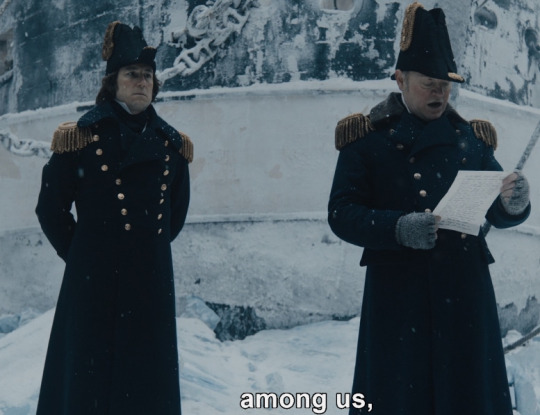
#the heron heareth#the terror#erin said to post this one its peer reviewed#i cannot stress enough how much the terror is in fact amongus
139 notes
·
View notes
Note
Top 5 gay things Bridgens and Peglar have done
not all of these are show exclusive. the book has some good parts
"i didnt volunteer to berth here for fear of the ice hassling terror, john"
the hand holding over the book. dave called it "a beautiful sex scene" and it still drives me nuts whenever i see the scene again i swear to god
the scene in the book where henry treks to erebus to deliver a letter and goes to find john who already knows its henry without even turning around to look at him ("ah, a little touch of harry in the night" you gay old man. youre kidding me)
the scene afterwards of them taking a little stroll together out on the ice with tuunbaq on the loose and in sub zero temperatures. so that they could talk privately
the fact that EVERY time henry hears about or is worried about something- he runs to john. not always for comfort but because he wants to hear johns thoughts. it happens in the show it happens in the book. henry hears trouble and thinks "oh i have got to get that mans input" the girls are GOSSIPINGGGG
#the heron heareth#the terror#bridglar#henry peglar#john bridgens#i love them . so fucking much#SOOOOOOO so much
81 notes
·
View notes
Note
which terror crewmate would wear the baby slut tank top and camo capris?
i know you said terror crew but for the life of me i cannot fucking think of any other character who deserves it

its collins. it has to be collins, right? its gotta be collins. final answer collins
#the heron giveth#the heron heareth#the terror#henry collins#drawings of men that tell you every last thing you need to know about a person#i feel so vulnerable posting this but the thing is? the terror girlies will love it#and so i will post it. i am being so brave#anyways i have a fic to read here take this im leaving GOODBYE im not TAKING QUESTIONS ABOUT IT#idk if anon was expecting a full drawing but YOURE GETTING ONE
92 notes
·
View notes
Note
how do you think things started. Did Bridgens or Peglar make the first move? Was it before or after John began tutoring him?
Brought up in the book, actually! He taught Peglar how to read while they were on their Beagle voyage and when they came home, he sought Bridgens out again for more lessons. At some point after finding him again, Peglar made the first move on him.
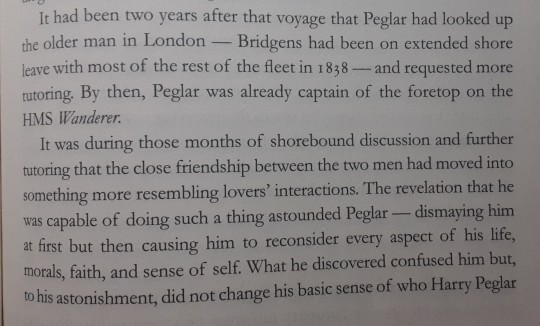

From chapter 28, the first of a handful of Peglar POV chapters. Despite the book being... the way it is, I do like how it does these two. If you were to read any part of it, read chapters 28 and 50. My suggestion to you heehee
#the terror#the heron heareth#i dont bother to headcanon outside what the book n the show does with them or at least their history together#david k had some thoughts about the mentor/student dynamic between them and i do appreciate his input he makes a good point#about how it could be seen as predatory as. yknow. john is a sodomite in the book. david k is also gay with a teaching background and he#emphasized the sort of stereotype that people put on gay teachers being creeps to young boys#nd that i can understand and appreciate. i hadnt considered it until i read that in an interview#so in my mind palace where i play with these diseased men like dolls i like to weave these things together in my own way#for fun. cause its fun#oh thats right tags um#john bridgens#henry peglar#briglar#bridglar#i always do both. Always
114 notes
·
View notes
Note
top 5 lines in the terror that make u laugh !!!
1. "... climbing, sir?"
2. When crozier is brooding in the dark in his room and jopson comes barreling in and goes "sorry to interrupt"
3. Tozer falling off the side of the ship and eating absolute shit. I didnt notice that the first several rewatches and it KILLED me
4. James' FUCKING face at carnivalle when he realizes crozier is back. The most apalled expression I have ever seen
5. It's not intentionally funny but I belt out laughing every time I hear "THERES NOTHING THAT WAAAY MR HOOOOAAAR"
62 notes
·
View notes
Note
this edward fellow …….. who is he…… i’m enraptured…
rubbing my little hands together oh its over for you now im in your head
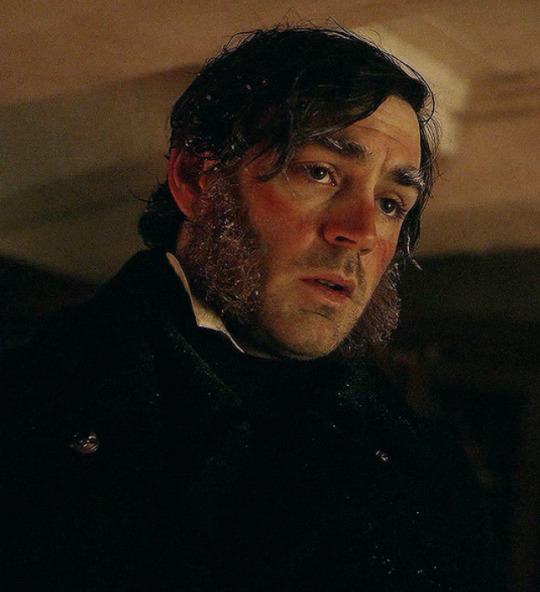
Lieutenant Edward Little of The Terror and worlds most sopping wet kitten of a man. trying his best and fucks up supremely but his heart is always always always in the right place and you can see this backfire on him nearly every episode. despite the horrors he has such manners always. i want to [INAPPROPRIATE COMMENT] [INAPPROPRIATE COMMENT] and [INAPPROPRIATE COMMENT] and [INAPPR
#the terror#the heron heareth#edward little#secret favorite of mine. i think he is so pathetic. i love him#paused in the middle of watching a different little boat show to post this jay your ask is SENDING ME#almost like you should watch the terror or something. jay. maybe you should watch the terrror#i have links.
69 notes
·
View notes
Note
I want to spoon feed you soup.
You can probably guess who this is.
Can we play pretend that I'm a washed up sailor who was thrown overboard from his ship in a storm and you are the kindly and modest lighthouse keeper that has rescued me from your shore and is nursing me back to health. Please say yes
31 notes
·
View notes
Note
i will continue to enable you actually. next top 5 john lynch images :3
I forgot this was in my inbox but hey better late than never

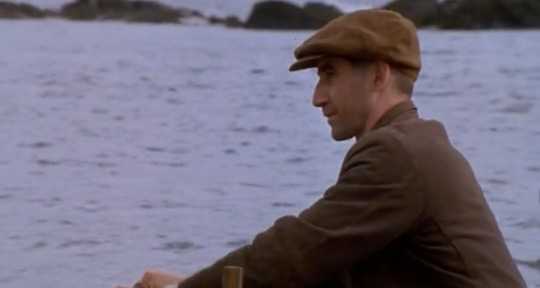

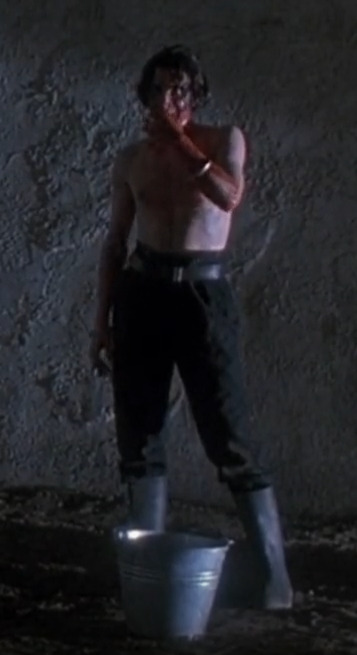

#Some Of My Favorites idk if i put any of these in the last one but he is simply so nice that you will see him twice#thank you eli for getting that stuck in my head#the heron heareth#i think we all need a little dose of that old man today god knows i do
28 notes
·
View notes
Note
watching the terror just for that image of john lynch
asks in my inbox like messages sent from angels
#the heron heareth#the terror#im so glad. im SOOOOO glad pls let me know when you get to the scenes hes in. ill draw him for you
27 notes
·
View notes
Note
top 5 characters from the terror (assuming there are more than 5??)
TWO people asked me this wow
1. PEGLAR <3 it's the historical context of him that really made him my favorite
2. Bridgens. For obvious reasons. This is how I got into the rest of John Lynch's work and i am forever changed for it
3. Silna. Shes the entire reason I started watching this show. I saw gifsets and character analysis posts and thought well she has got to be an interesting character. Anf then she was and she is and she added so much more to the experience of the show than I anticipated. I'm Love hHer
4. Goodsir. Sad wet hamster of a man. He brings me immense joy
5. Hartnell has become one of my favorites as of recently. Hes just a peach I like him so much
#the terror#the heron heareth#henry peglar#john bridgens#silna#lady silence#harry goodsir#tom hartnell#God thats so many
34 notes
·
View notes
Note
Bridgens: you are a good man
also Bridgins: stop it you two or I’ll have Sir Franklin turn these boats around and there will be no Northern Passage for anyone.
so true but im taking this to bounce a headcanon off of: once franklin's gone i like to imagine that john and james became very close for the fact that hes. yknow. the officer's steward and also now the sole oldest man on this expedition which is a no brainer for daddy issues fitzjames which means he is probably subject to all of james' weird obsessive ramblings about francis gone off the rails which means he is GOING to break up a few cat fights have you seen him john is huge. just holding them both away from each other sighing so hard. he cant even give james a book reccomendation to read and apply to his situation hed just take the book and throw it at crozier's head and john Knows This. hes so tired. these men are out of their minds hes too old and scurvy riddled for this
#the heron heareth#the terror#john bridgens#james fitzjames#i forgot this was in my ask box HI#where did that all come from oh my god#posting it nayways bc somebody will agree with me and also this ask was funny LOL
30 notes
·
View notes
Note
anonymous opinion: you are gay. i am a big fan
I do my best thank you
13 notes
·
View notes
Note
Very glad that you got this URL but I must admit I am going to miss Pocket (Pussy) Peglar
it was his pocket book the historians they call it a pocket book he had a pocket book on him the peglar papers were in a pocket book it was a book in his pocket for henry peglar it was peglars pocket book a pocket peglar
#the heron heareth#I SAY THIS IN JEST. i know who this is (i think) and i am kissing you on the cheek fondly this is very funny
25 notes
·
View notes
Note

Reading this as though you're picking yourself up off of the floor and coming to from fainting.
Groggy. not sure what day time or year it is. Vision blurry. Grasping a chair that falls over.
i dont know who that is and ive never heard of that actor in my life what are you talking about
#the heron heareth#just kidding. i got a big stupid crush on that old man#and also good morning wilbur <33333#which reminds me who wants ghosted art soon. anybody? nobody? too bad im making ghosted art youll GET SOME
15 notes
·
View notes